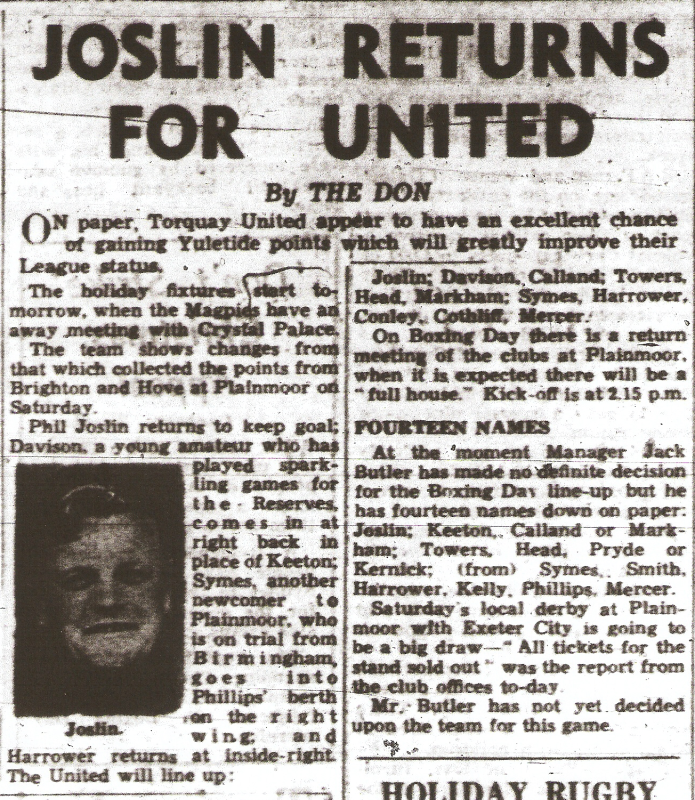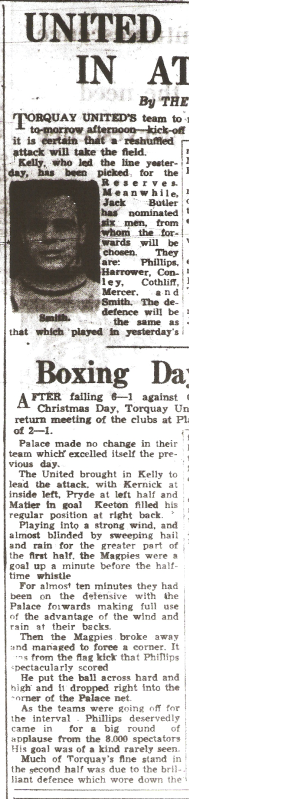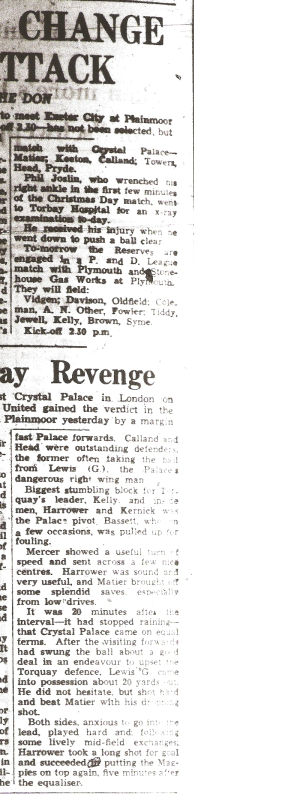Post by Budleigh on Jan 14, 2010 12:14:16 GMT
There’s been mention on another thread about how up until the late fifties football matches were played on Christmas Day (indeed, Christmas Fixtures Past was a theme I put into the Boxing Day TFF pages in the programme thanks to unearthing Barton Downs excellent research).
Here’s a really interesting programme from the Christmas Day game played on resumption of league football after the Second World War and has some great features in it.
It is for our away match at Selhurst Park against Crystal Palace in the Third Division (South), a game played in front of just under 12,000 spectators. Unfortunately United lost heavily, 6-1, with Dave Mercer (son of pre-war United player Dave Mercer Snr.) scoring our solitary goal. We then went on to win the reverse fixture at Plainmoor, played the following day, Boxing Day, by two goals to one. Although playing two games in this way over the Christmas period was the norm what is interesting is the early form of ‘squad rotation’ which may’ve contributed to the two differing scorelines.
For starters the goalkeeper is printed as being Gerry Matier, signed from Coleraine, and who had played the previous four games in place of Phil Joslin. But he didn’t actually start this game, Joslin did, with Matier coming back in the following day and keeping his place for a further nine games after that. So obviously manager Jack Butler decided that two games in two days was too much to ask of our keeper. This also seems to be the reasoning behind the rest of the line-up for this Christmas Day game.
Arthur Davison came in at no.2 for his only game of the season, indeed his only game ever for United, in place of the regular Bob Keeton, with the same happening at no.7 where Colin Syme played his one-and-only game for United in place of Russell Phillips with both the ‘regulars’ returning for the next day’s game. Another regular, no.9 Conley, played in this match but was replaced the next day, for the one game only, by Don Kelly who’d previously only run-out three times for Torquay at the beginning of the season and then played only once more the following year.
Therefore only five players played in both games, which is not surprising considering that after a single days break we were then at home to Exeter on the 28th. Three games in four days.
So did the management feel that this was the ‘lesser’ of the three games in terms of the chance to get a result? It would seem so, and it would appear correct, as the two following games were won 2-1 whilst this one was lost heavily. And we think this practice is new in the game!
The fixtures list on the back shows Palace losing their second league match 2-10 away to Reading. This must’ve been their record defeat in the league as, at this point their record in all competitions was a 4-11 loss to Manchester City in the 1926 FA Cup. Indeed this is still Reading’s record victory.
And how about the other interesting parts to the programme?
Supporters helping out the Palace finances by paying a voluntary extra 3d on top of the entrance fee of 1/3 to help fund the purchase of new players; A letters page with suggestions from supporters; Christmas jokes; 'Meet the Team' over tea after the game!
And the best to last, two pages on a scheme where fans can help ‘Choose the Team’. Luckily the owner of this programme chose not to take up the offer or we would’ve lost these pages.











Here’s a really interesting programme from the Christmas Day game played on resumption of league football after the Second World War and has some great features in it.
It is for our away match at Selhurst Park against Crystal Palace in the Third Division (South), a game played in front of just under 12,000 spectators. Unfortunately United lost heavily, 6-1, with Dave Mercer (son of pre-war United player Dave Mercer Snr.) scoring our solitary goal. We then went on to win the reverse fixture at Plainmoor, played the following day, Boxing Day, by two goals to one. Although playing two games in this way over the Christmas period was the norm what is interesting is the early form of ‘squad rotation’ which may’ve contributed to the two differing scorelines.
For starters the goalkeeper is printed as being Gerry Matier, signed from Coleraine, and who had played the previous four games in place of Phil Joslin. But he didn’t actually start this game, Joslin did, with Matier coming back in the following day and keeping his place for a further nine games after that. So obviously manager Jack Butler decided that two games in two days was too much to ask of our keeper. This also seems to be the reasoning behind the rest of the line-up for this Christmas Day game.
Arthur Davison came in at no.2 for his only game of the season, indeed his only game ever for United, in place of the regular Bob Keeton, with the same happening at no.7 where Colin Syme played his one-and-only game for United in place of Russell Phillips with both the ‘regulars’ returning for the next day’s game. Another regular, no.9 Conley, played in this match but was replaced the next day, for the one game only, by Don Kelly who’d previously only run-out three times for Torquay at the beginning of the season and then played only once more the following year.
Therefore only five players played in both games, which is not surprising considering that after a single days break we were then at home to Exeter on the 28th. Three games in four days.
So did the management feel that this was the ‘lesser’ of the three games in terms of the chance to get a result? It would seem so, and it would appear correct, as the two following games were won 2-1 whilst this one was lost heavily. And we think this practice is new in the game!
The fixtures list on the back shows Palace losing their second league match 2-10 away to Reading. This must’ve been their record defeat in the league as, at this point their record in all competitions was a 4-11 loss to Manchester City in the 1926 FA Cup. Indeed this is still Reading’s record victory.
And how about the other interesting parts to the programme?
Supporters helping out the Palace finances by paying a voluntary extra 3d on top of the entrance fee of 1/3 to help fund the purchase of new players; A letters page with suggestions from supporters; Christmas jokes; 'Meet the Team' over tea after the game!
And the best to last, two pages on a scheme where fans can help ‘Choose the Team’. Luckily the owner of this programme chose not to take up the offer or we would’ve lost these pages.














